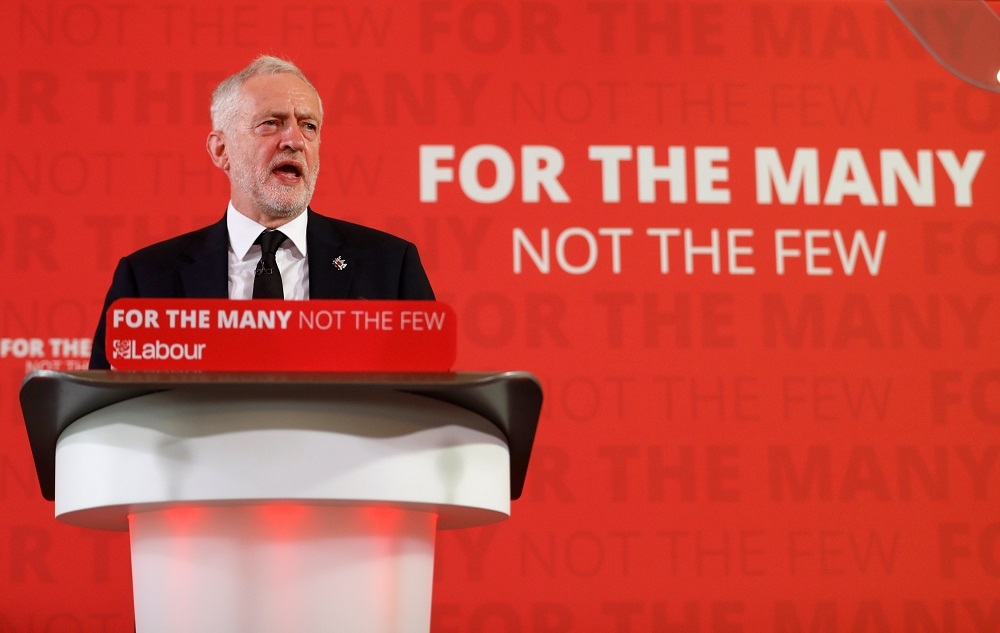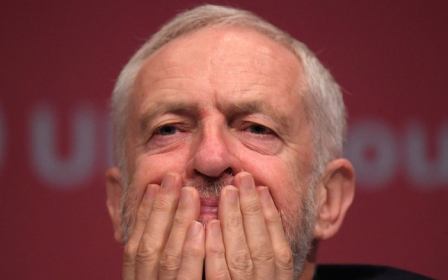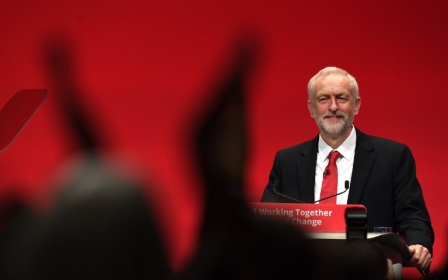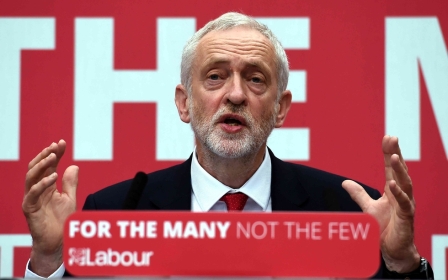What Jeremy Corbyn can teach the Arab Spring

What a difference a year makes. This time last year Jeremy Corbyn was fighting to stay leader of the Labour Party. It mattered little that he had just been re-elected by 250,000 party members, the largest mandate ever won by a party leader. It mattered even less that Labour had become the largest political party in Europe.
Corbyn was savaged by Labour MPs and the media at every turn. “They won’t stop until they see our blood on the floor,” one member of his team observed. Corbyn was assailed for not singing the national anthem, for debating whether to wear a white or red poppy, for refusing to kneel before the Queen. The right wing Daily Mail styled him “Comrade Corbyn”. The soft left were even less forgiving.
The BBC, a public service broadcaster with a legal duty to be impartial, also had the knives out for him. In one infamous interview, Laura Kuenssberg, its political editor, did not so much grill Corbyn, as turn him over slowly on a roasting spit.
Kuenssberg assailed him for his well-known opposition to nuclear weapons, and - in a longer interview published online - for his opposition to shoot-to-kill policing.
LK: [interrupting] So yes or no. You would never push the nuclear button?
JC: I've answered you perfectly clearly. It's immoral to have or use nuclear weapons. I've made that clear all of my life.
At no point did she balance her attack with counter-arguments, such as the widespread scepticism of military strategists about the wisdom of maintaining a weapon Britain could never use independently. Her polemical purpose was to portray Corbyn as man unfit to govern, who could not be trusted to defend his country.
"Arab states do not need yet another traditional leader. They need a transformation."
Half the shadow cabinet helped her to convey this message: Andy Burnham, shadow home secretary; Maria Eagle, shadow defence secretary; Hilary Benn, shadow foreign secretary; Angela Eagle, shadow business secretary; Lord Falconer, shadow justice secretary; and Heidi Alexander, shadow health secretary.
Kuenssberg was taken to the BBC Trust for that interview and the Trust ruled in Corbyn’s favour. It found that the BBC’s political editor had inaccurately reported the Labour leader’s views about shoot-to-kill, presenting his general views as a response to a specific question about the Paris attacks, when they plainly were not.
Kuenssberg was undeterred by the finding that she had breached the BBC’s own rules of impartiality and fairness. It was the political hunting season, and Corbyn was fair game. Martha Kearney, John Humphreys were all part of the hunting party.
A remarkable transformation
Fast forward a few months and look how differently Kuenssberg (who turned up at the Labour Party conference with a bodyguard) treats Corbyn. Gone are the smears and the epithets. Corbyn is being reported straight. The BBC is starting to treat Corbyn seriously as a future prime minister.
Which is just as well, because he could easily yet be one. Even if he never is, the Labour leader is setting the domestic agenda. Austerity, privatisation of the NHS, inner city regeneration (code for gentrification), student fees, zero contract hours - the words which formed the narrative for the last two decades have become politically toxic. The beleaguered Prime Minister Theresa May will unveil in her party conference speech today a new council house building programme. Would she have done this without Corbyn breathing down her neck? Labour will never again be - in Peter Mandelson’s phrase - intensely relaxed about the filthy rich. (In February this year, Mandelson said he worked to undermine Corbyn “every day”.)
Whatever the future holds for him, Corbyn has changed the political landscape. Corbyn’s transformation from muppet to master of all he surveys is remarkable. And it holds clear lessons for the battered battalions of the Arab Spring.
Corbyn has much in common with the forces that led the Arab Spring: both represent the poor and the working classes; both emerged from the fringes of the political spectrum; both surprised the establishment; both had the overwhelming majority of the media against them; and both were the frequent targets of attempted coups.
The military coup in Egypt succeeded, but the same counter revolutionary forces funded by the same dictatorships also tried a coup in Tunisia, Turkey and latterly in Qatar. The right wing of the Labour Party and the most senior members of the parliamentary party openly and repeatedly tried to unseat their party leader.
But there are significant differences, too. In his most difficult moments, Corbyn stuck by his constituency and never distanced himself from it; he did not appease, even in moments when he looked bad; he did not triangulate or change his message. He stuck to his guns in the knowledge that voters would deliver, which they did.
The Islamist victors of the first free elections in the modern history of Egypt and Tunisia thought they needed to reconcile with their enemies in the old regime, big business and the establishment to secure stability in society. By doing so, they allowed the establishment to drive a wedge between them, their voters, and their fellow revolutionaries.
Mohamed Morsi begun his presidency by taking an oath in Tahrir Square. He ended it by abandoning the secular left in favour of his new found friends in the army. A week before they marched him off to prison, Morsi thought the army had his back. Today, a continually compromising - and compromised - Ennadha party in Tunisia backed a law giving amnesty to corruption in the era of Ben Ali. To be a supporter of the Arab Spring is to be continually betrayed. And for what? Scraps of international aid? The IMF?
Not that their former partners in the secular left fared much better. They were corrupted by the bribes they were given to sabotage their fellow revolutionaries; they too played identity politics, lacking the vision to understand that unity was more important than sectional gain.
For the many, not the few
Corbyn’s movement understood that the media would never back him. So it created its own alternative channels of communication with the electorate which worked well - social media, meetings on the door step and in the town hall - all well below the radar of the national media.
The forces which led the Arab Spring were overwhelmed by the hostility of the media and could not keep in touch with their electorate. In exile they are still far from being a government in waiting. The Brotherhood is wracked by splits, and can only really come alive again under a new leadership drawn from its youth. Other elements of the opposition are in an even worse state.
Neither are addressing the central question in the Arab world. This is no longer about identity politics and whether you label yourself Islamist or secular. It is about how to govern, in Corbyn’s words, for the many not the few.
Its about giving everyone a fair share of the state’s resources, about creating a state which protects rather than preys off its people. Its about a functional and fair minded economy, transparent and accountable government. To this neither political Islam nor the other opposing secular liberal forces provide alternative answers other than to mouth the discredited economic mantra of global capital. They are resilient as a protest movement, but they have no programme, no manifesto for the day after a dictator falls. They seek power but have little idea what to do with it. They have had a long time to think about it in prison.
I am not saying these opposition forces are redundant. They are needed now more than ever before because Arab regimes since the fall of the Ottoman Empire, have failed miserably to create a self-confident, independent and economically prosperous Arab world, and their model of governance is broken.
Look at the wealthiest country in the Arab world, Saudi Arabia, a regime which is now trying to rebrand itself as a champion of women’s rights. It has just given up half a trillion dollars of its wealth in civil and military contracts, and pledges, to Donald Trump, while their economy is contracting.
In contrast, Corbyn does have a plan and if the turnaround in his fortunes was attributed to any single factor it was his manifesto. Just five weeks before the date of the last general election, Corbyn was trailing 20 points in the polls behind the Conservatives, having just lost massively in local elections. His fortunes changed once his manifesto appeared. Why? Because for the first time in a generation, it offered voters a genuine alternative.
There is another lesson here for the forces of the Arab Spring: public opinion is volatile and no battle is ever won or lost. The counter-revolutionary forces of absolute monarchs and military dictators have squandered billions of dollars selling the notion that the Arab Spring is dead and that everyone who took part in it should pack up and go home. Corbyn proves there is life after death.
Lesson number one: never give up. Lesson number two: know your constituency. Lesson number three: never allow anyone to get between you and it. Lesson number four: create your own media. Lesson number five: construct a programme that helps the working class. Lesson number six: do not try to reconcile with those who hate you, because you will lose either way.
Whatever the future holds for him, Corbyn has changed the landscape of British politics - which is more than can be said for a host of Labour leaders before him. Arab states do not need yet another traditional leader. They need a transformation. That can only be done from the inside, from the youth upwards. No outside power is going to help them. In fact, it will actively thwart them. This is a job for Arabs themselves. They have already paid in blood for losing once, in Egypt, in Syria, in Libya, in Yemen. One day, however, they will prevail and for that they have to prepare now.
- David Hearst is editor-in-chief of Middle East Eye. He was chief foreign leader writer of The Guardian, former Associate Foreign Editor, European Editor, Moscow Bureau Chief, European Correspondent, and Ireland Correspondent. He joined The Guardian from The Scotsman, where he was education correspondent.
The views expressed in this article belong to the author and do not necessarily reflect the editorial policy of Middle East Eye.
Photo: Corbyn has much in common with the forces that led the Arab Spring (Reuters)
Middle East Eye propose une couverture et une analyse indépendantes et incomparables du Moyen-Orient, de l’Afrique du Nord et d’autres régions du monde. Pour en savoir plus sur la reprise de ce contenu et les frais qui s’appliquent, veuillez remplir ce formulaire [en anglais]. Pour en savoir plus sur MEE, cliquez ici [en anglais].





